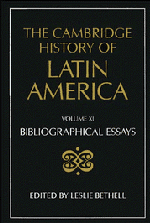Book contents
- Frontmatter
- I THE INDIGENOUS PEOPLES OF MIDDLE AND SOUTH AMERICA ON THE EVE OF THE CONQUEST
- II COLONIAL SPANISH AMERICA
- III COLONIAL BRAZIL
- IV THE INDEPENDENCE OF LATIN AMERICA
- V LATIN AMERICA: ECONOMY, SOCIETY, POLITICS, c. 1820 TO c. 1870
- 1 Post-independence Spanish America: Economy and society
- 2 Post-independence Spanish America: Society and politics
- 3 Mexico
- 4 Central America
- 5 Haiti and the Dominican Republic
- 6 Cuba, c. 1760–c.1860
- 7 Venezuela, Colombia and Ecuador
- 8 Peru and Bolivia
- 9 Chile
- 10 The River Plate republics
- 11 Brazil, 1822–1850
- 12 Brazil, 1850–1870
- VI LATIN AMERICA: ECONOMY, SOCIETY, POLITICS, c. 1870 to 1930
- VII LATIN AMERICA: ECONOMY, SOCIETY, POLITICS, 1930 to c. 1990
- VIII IDEAS IN LATIN AMERICA SINCE INDEPENDENCE
- IX LATIN AMERICAN CULTURE SINCE INDEPENDENCE
- X THE INTERNATIONAL RELATIONS OF LATIN AMERICA SINCE INDEPENDENCE
- THE CAMBRIDGE HISTORY OF LATIN AMERICA
2 - Post-independence Spanish America: Society and politics
from V - LATIN AMERICA: ECONOMY, SOCIETY, POLITICS, c. 1820 TO c. 1870
Published online by Cambridge University Press: 28 March 2008
- Frontmatter
- I THE INDIGENOUS PEOPLES OF MIDDLE AND SOUTH AMERICA ON THE EVE OF THE CONQUEST
- II COLONIAL SPANISH AMERICA
- III COLONIAL BRAZIL
- IV THE INDEPENDENCE OF LATIN AMERICA
- V LATIN AMERICA: ECONOMY, SOCIETY, POLITICS, c. 1820 TO c. 1870
- 1 Post-independence Spanish America: Economy and society
- 2 Post-independence Spanish America: Society and politics
- 3 Mexico
- 4 Central America
- 5 Haiti and the Dominican Republic
- 6 Cuba, c. 1760–c.1860
- 7 Venezuela, Colombia and Ecuador
- 8 Peru and Bolivia
- 9 Chile
- 10 The River Plate republics
- 11 Brazil, 1822–1850
- 12 Brazil, 1850–1870
- VI LATIN AMERICA: ECONOMY, SOCIETY, POLITICS, c. 1870 to 1930
- VII LATIN AMERICA: ECONOMY, SOCIETY, POLITICS, 1930 to c. 1990
- VIII IDEAS IN LATIN AMERICA SINCE INDEPENDENCE
- IX LATIN AMERICAN CULTURE SINCE INDEPENDENCE
- X THE INTERNATIONAL RELATIONS OF LATIN AMERICA SINCE INDEPENDENCE
- THE CAMBRIDGE HISTORY OF LATIN AMERICA
Summary
In addition to works treating political themes for Spanish America as a whole, this bibliographical essay touches on some works on individual countries that have wider significance, either because their conclusions are broadly applicable or because they may be taken as models for study in other places.
David Bushnell and Neill Macaulay, The Emergence of Latin America (New York, 1988) is a general survey of Latin America in the nineteenth century full of interesting detail and gracefully written. Stanley J. Stein and Barbara H. Stein, The Colonial Heritage of Latin America: Essays on Economic Dependence in Perspective (New York, 1970), as its title suggests, interprets Latin American history from the vantage point of dependency analysis. Its exposition includes political as well as economic features of the nineteenth century, both sketched rather schematically. Tulio Halperín Donghi deals with the society and politics of the post-independence period era in a perspicacious and sophisticated way in two texts: chaps. 3 and 4 of his Historia contemporánea de América Latina (Madrid, 1969; Eng. trans., 1993) and The Aftermath of Revolution in Latin America (New York, 1973). Finally, E. Bradford Burns, in The Poverty of Progress: Latin America in the Nineteenth Century (Berkeley, 1980), offers another general interpretation much influenced by the perspective of dependency analysis, which stresses the conflict between an exploitative Europe-oriented dominant class and a resistant ‘folk.’ Burns’s observations about the dominant class generally are more persuasive than his account of the ‘folk,’ about whose attitudes there is still rather little solid information.
- Type
- Chapter
- Information
- The Cambridge History of Latin America , pp. 252 - 259Publisher: Cambridge University PressPrint publication year: 1995
- 1
- Cited by

